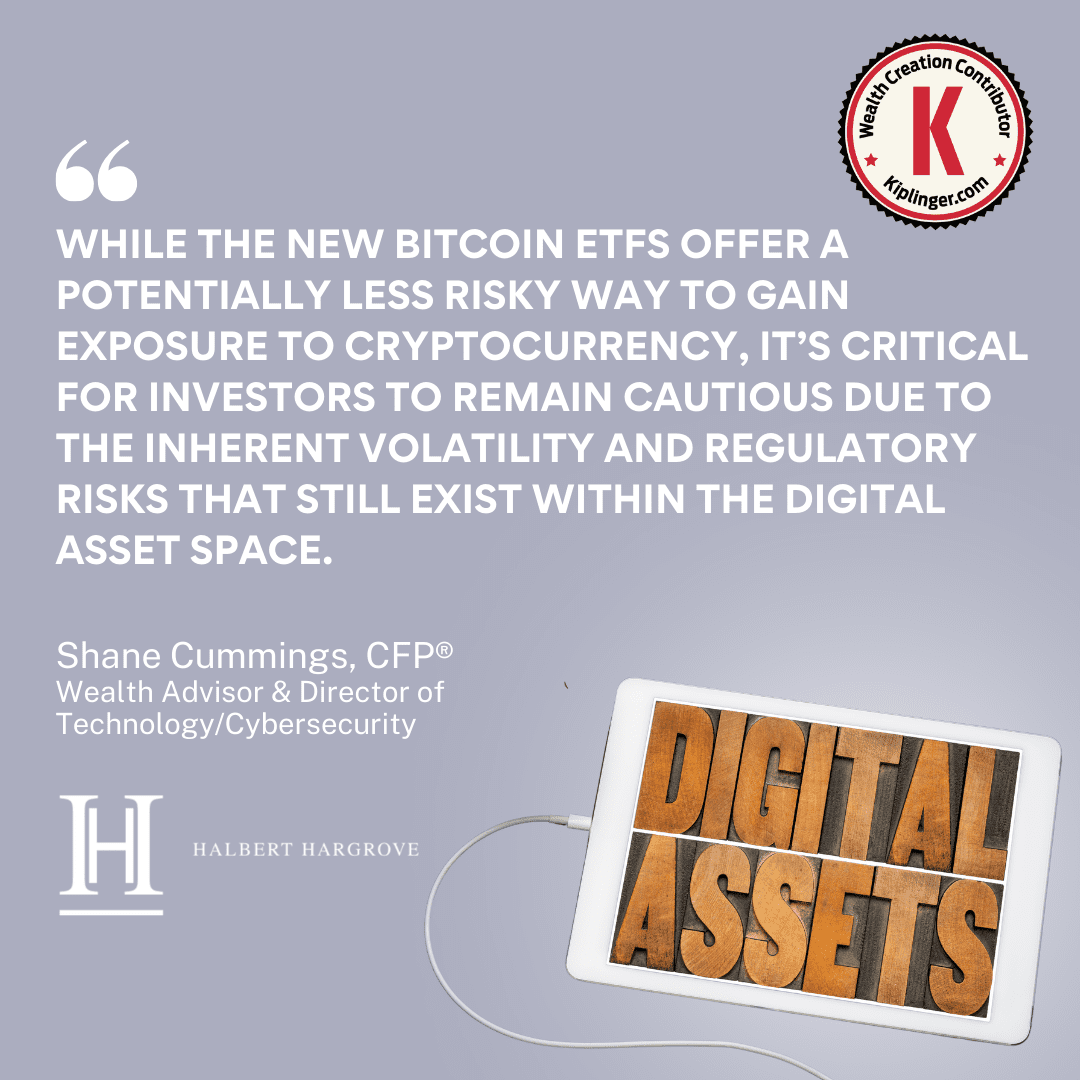By Shane Cummings, CFP®, AIF®, Wealth Advisor & Director of Technology/Cybersecurity as featured in Kiplinger
There’s a growing appetite for new ETFs that make it easier to invest in cryptocurrency, including bitcoin. But investors should still proceed with caution.
Digital assets and cryptocurrencies have captured significant attention in recent years. Despite retreating significantly at the start of 2024, the total crypto market has recently experienced strong price appreciation and stands at $3.59 trillion in total market capitalization. The digital asset space continues to evolve with important developments that merit attention. In this article, we’ll dive into recent changes and what they may mean for investors navigating the world of digital assets.
What should we expect in 2025? With Donald Trump winning another presidential term, there has been a broad rally in digital asset prices. Many investors seem to expect the next Trump administration to provide more support for digital assets and likely remove governmental obstacles to crypto projects. SEC Chairman Gary Gensler has announced his upcoming departure as head of the SEC. Gensler has been a critic of digital assets and brought several lawsuits against various crypto projects on behalf of the U.S. government. The current Trump administration nominee to run the SEC, Paul Atkins, is expected to be much less hostile to crypto and regulation of crypto exchanges. This might mean the SEC will turn its attention to other issues and not focus on taking action to restrict certain digital assets.
This may explain the rally in digital assets prices we’ve seen since the 2024 presidential election. Bitcoin has topped $100,000 in December, which is a significant milestone. Many other top digital assets are seeing major price gains as well.
New ETFs mean a new way to invest
Earlier this year, the SEC approved the launch of several bitcoin (BTC) exchange-traded funds. What does this mean for bitcoin investing? Before the launch of ETFs, investors could invest in bitcoin only by holding the tokens directly, through an exchange or in limited circumstances a fund, such as the Grayscale Bitcoin Trust. However, due to the structure of the Grayscale Trust, it didn’t always track the price performance of bitcoin itself.
The new bitcoin ETFs are designed to more closely track the price of bitcoin while offering lower costs to investors and allowing for intraday trading, similar to buying or selling a stock. As of October 2024, the largest among them is the iShares Bitcoin Trust ETF, with $21.1 billion in assets. The launch of these ETFs and increased liquidity is expected to attract more institutional interest in digital assets and increase inflows into bitcoin ETFs.
Hot on the heels of bitcoin ETFs, the SEC approved ethereum ETFs later in 2024, and similar ethereum-tracking ETFs launched shortly afterward. Currently, the largest ETF in this space is the Grayscale Ethereum Trust, with $972 million in assets. Ethereum is typically the second-largest crypto asset by value, after bitcoin. Both bitcoin and ethereum are the most well-known and liquid digital assets, largely due to their strong investor bases and extensive network usage. Ethereum is often recognized for its versatile smart contract capabilities, while bitcoin remains dominant as a store of value.
Some providers, like Bitwise, also offer ETFs that invest in digital assets beyond bitcoin and ethereum, such as Solana, XRP (Ripple) and Cardano. However, these lesser-known digital assets tend to be more volatile and less liquid. Their prices are often driven by behind-the-scenes trading, making pricing trends harder to predict. For that reason, risk-averse investors may want to avoid investing in lesser-known cryptos. Additionally, these assets may carry more regulatory risk or idiosyncratic risk.
Buying digital assets direct vs ETF investing
For investors seeking certain features, such as active tax-loss harvesting, owning digital assets directly may still be valuable. Currently, tax law does not subject digital assets to wash-sale restrictions, meaning investors can sell digital assets to harvest tax losses and then immediately buy them back. This is not allowed with marketable securities, offering a potentially significant advantage for taxable crypto investors looking to offset capital gains.
However, owning digital assets directly on an exchange introduces complications, such as the risk of being hacked or managing a digital wallet. Unlike traditional securities, digital assets are not as regulated, and fewer protections are in place than on traditional brokerage platforms. For casual investors, digital asset ETFs may remove some of these headaches. A financial adviser can help you determine an appropriate approach to investing in digital assets.


